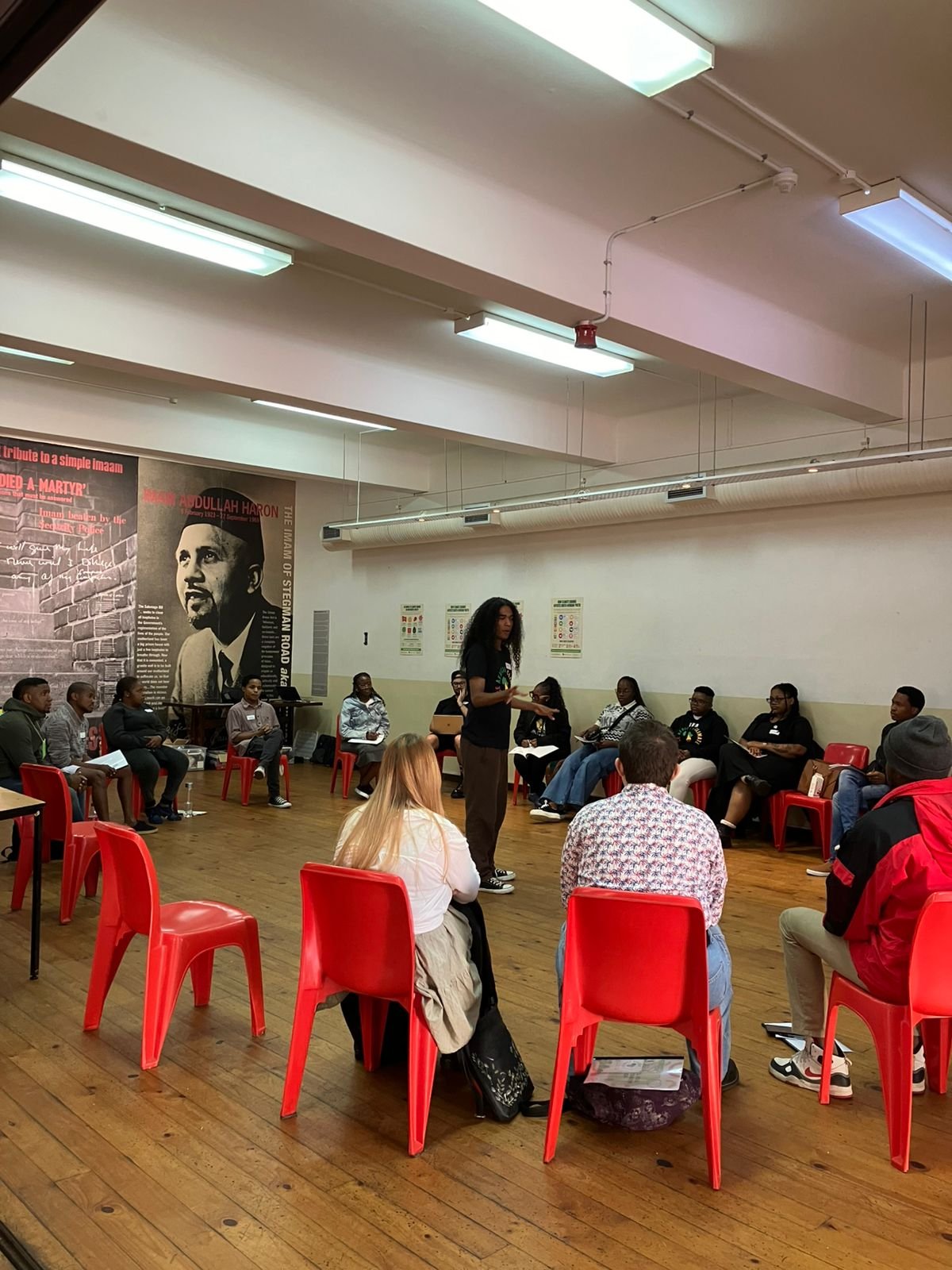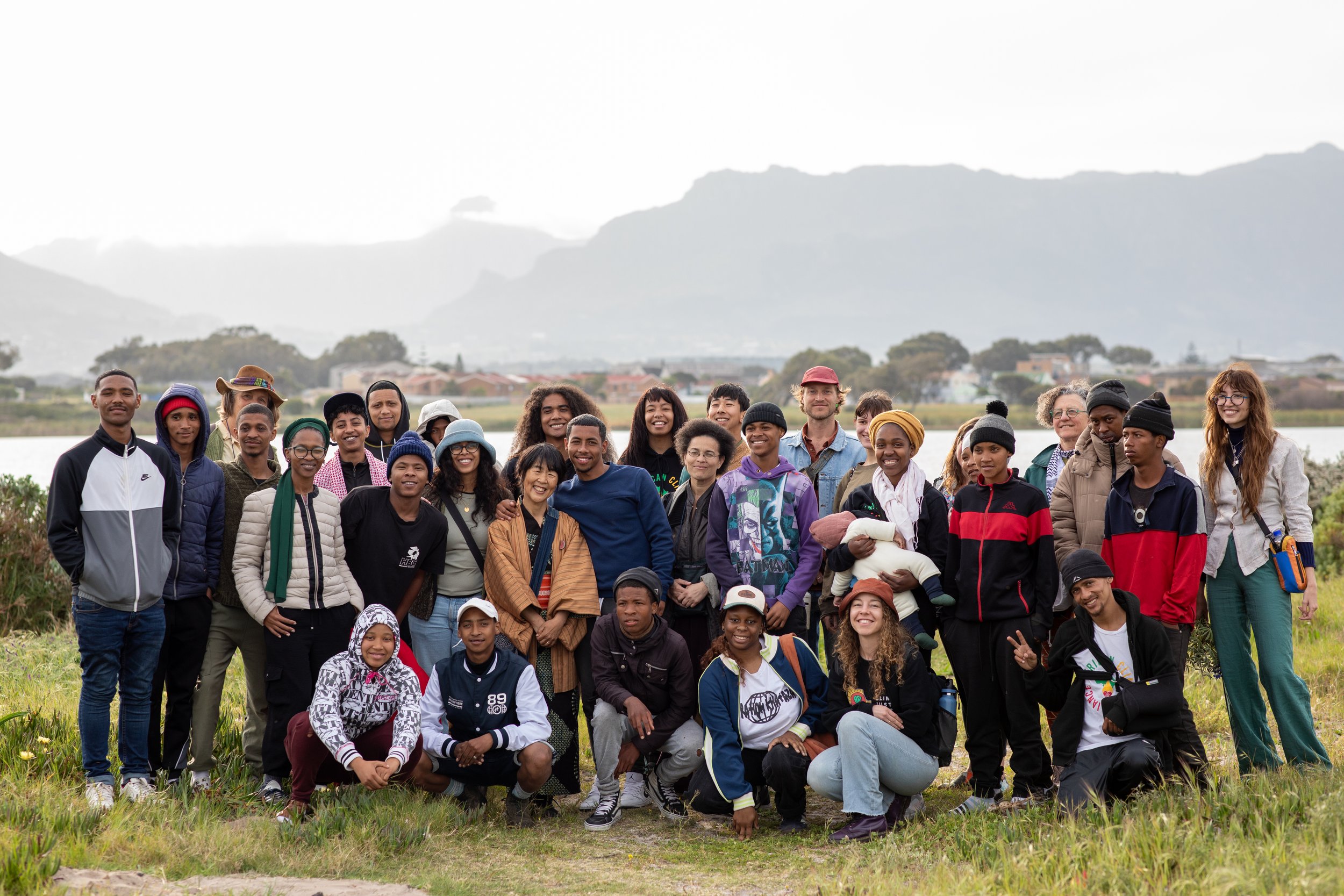Quarterly Newsflash: Passing of the Climate Change Act, Cancel Coal campaigning, and hosting the third-annual Cape Town Climate Week
A 2024 third-quarter newsflash from the ACA team
The third quarter of 2024 kept us on our feet with many movement-building moments, workshops, and our annual Cape Town Climate Week. As we prepare for the final quarter of 2024, here’s a brief look at what we have been up to in July, August, and September:
Celebrating a huge climate win – the passing of the Climate Change Act
On 23 July, history was made with the signing into law of the Climate Change Act. This is the first piece of legislation in South Africa that is specifically aimed at addressing the effects of climate change by setting out a national climate change response, including mitigation and adaptation actions, which also constitutes South Africa’s fair contribution to the global climate change response. But, the Act is not yet operational. It will only come into effect on a future date when the President issues a proclamation. ACA is proud to have contributed to this win through education on the bill and act, as well as engaging in consultations on the policy.
Doubling down on Cancel Coal campaigning
Image: Julia Evans via Daily Maverick
The #CancelCoal campaign has seen a whirlwind of activity, ahead of the court hearing dates on 9 and 10 October, including engaging students, youth leaders, and the broader public through workshops, an exhibition stall, and a regular newsletter. These activities aimed to raise awareness about the detrimental effects of coal, promote the campaign's petition and empower individuals to take action for a just energy transition.
The UCT workshop, held in collaboration with the UCT Green Campus Initiative and Fossil Free South Africa, engaged university students in a thought-provoking discussion on climate justice and the #CancelCoal campaign. The workshop featured an exclusive screening of the "Temperature Rising" documentary, followed by a Q&A session and petition signing.
The Energy Day stall, set up during Cape Town Climate Week, offered a dynamic platform for the campaign to interact with a diverse audience. Participants engaged in petition signing took photos with campaign materials, and expressed their support for a coal-free future.
The #CancelCoal Newsflash newsletter continued to serve as a vital link to the activist community, providing updates on the campaign, highlighting artists contributing to the cause, and sharing opportunities for involvement.
We also developed a ‘How To Get Involved’ resource that outlines how people can get involved in the Cancel Coal campaign – from starting conversations, signing our petition, emailing government representatives, and hosting school activations.
Lastly, we published the final episodes of our podcast’s second season. This season focused on our Cancel Coal campaign and was hosted by two members of our Cancel Coal Youth Task Force. It comprises 5 episodes that explore the multifaceted impacts of coal mining and the way forward for our energy future.a
The court case was heard on 9 and 10 October. More details to come in a future Newsflash.
Developing spokespeople
Ahead of the Cancel Coal court dates in October, we held a two-day intensive media training workshop for 15 young people from across South Africa – including from coal-affected communities – who have been actively involved in ACA campaigns the past 3 years. We shared an overview of the South African media landscape, workshopped personalised messaging that draws on their lived experience, practiced interview skills, and raised the confidence of these young people in their abilities to engage with the media.
Hosting our third- annual Cape Town Climate Week
Cape Town Climate Week took place from 23-27 September 2024 and was a call to reconnect — with each other, with nature, with land, with food, with water, with the world around us. Nine events, with over 200 attendees across the week, were hosted by several different partner organisations across the city, aligning with the themes of energy justice, water justice, global solidarity, food justice, spatial justice, and gender justice.
Day one kicked off with exploring how to work toward a just energy future with an Energy Resilience Exhibition and a screening of the “Temperature Rising” documentary. Day 2 started at the Castle of Good Hope for the #IAmAnAfrican anti-xenophobia rally and ended with a walk and talk along the water body of Princess Vlei – a treasured wetland on the Cape Flats named after a Khoe princess.
On Day 3, we got our hands dirty in the soil with over a hundred young people from across Cape Town coming together to plant at a primary school in Langa. On Day 4, we made our way from Mowbray, through Athlone, to Langa, to the City Centre, to Seapoint, and back by bike, train, and foot. We witnessed the divides of spatial Apartheid by bike and experienced the importance of connecting communities through urban mobility and social housing by train and foot. The final day began by discussing food and land justice in the Philippi Horticultural Area and ended with a panel discussion about gender justice and the climate crisis. And whilst this year’s event has come to a close, imaginations and dreams for a more just city are only just beginning.
Developing five Cape Town Climate Week knowledge-building resources
As a part of our Cape Town Climate Week knowledge building and popular education, we published a downloadable resource for each day of Cape Town Climate Week that spoke to the 5 themes of the week and how they are connected to climate justice. These thematic areas are: energy justice, water justice, food justice, spatial justice, and gender justice. In addition to the resources we have also added ways to get involved and take actions going forward.
Knowledge-building with our 2024 ACA Ambassadors
In the past three months, we hosted three online sessions with our new 2024/25 cohort of 32 ambassadors from South Africa, Zimbabwe, Malawi, Zambia, Namibia, Democratic Republic of Congo, Cameroon, Kenya, Botswana, Lesotho, Uganda and Nigeria.
The first ambassador session was titled “Sharing Our Contexts” where ambassadors learnt about the importance of understanding each other’s backgrounds and communities as people who come from different walks of life. The second was titled “Power and Positionality”. Here, ambassadors learnt about understanding their power and positionality within the climate justice movement. The third session on Environmental Education provided insight into the importance of environmental education.
Hosting the ACA Writing Circle and publishing our second op-ed
We’ve officially published our second op-ed, Challenging outdated norms and bridging the gender gap in African climate action, crafted by the ACA Writing Circle! This one came after four sessions of brainstorming, workshopping, and writing a Women’s Month op-ed that unpacked the need to improve and implement policy that addresses the specific challenges faced by women, who contend with a ‘triple burden’ of unpaid domestic work, existing inequality and the direct impacts of climate change and climate-related migration.
As an extended Writing Circle offering, we opened up the opportunity for members to submit written work that they’d like to have published on the ACA blog, after a collaborative editing process. So far, we have edited and published one submission on water equity and the case study of Rwanda by Rachel Itenderezwe.
Building continental solidarity with Africa’s Youth Voices
Since launching our third annual Africa’s Youth Voices Online Conference Series in May, we have continued to host sessions that redefine the climate justice narrative with youth in Africa at the centre, ahead of COP29.
In the final three sessions of the conference series, participants collaborated on projects and campaigns that aim to amplify the perspectives, experiences, and ideas of young people in Africa when it comes to creating a just future for all.
Engaging schools and movement-building
Over the past three months, we engaged approximately 270 students across Cape Town as part of our ongoing school outreach programme to mobilise students from across Cape Town to get involved in climate action. We ran climate justice educational workshops at two high schools – Manyano High School and Rhodes High School.
Supporting an artivism workshop in Uganda
It has always been our vision to support decentralised actions across the continent in the pursuit of climate justice. With our growing network of activists across the continent, this dream is starting to be realised. In September, we supported Congolese artivist, based in Uganda, Aksanti Bienfait to host an artivism workshop in Uganda for refugee communities to paint their visions for a just future and express their emotions when it comes to climate change. It was a powerful space for imagining, expression, connection, and creativity.
Strengthening change-making partnerships with local organisations
We believe that the movement for justice will only grow through thoughtful and impactful collaborations, which is why we are committed to partnering with as many values-aligned organisations.
Over the past two months, we have seen two workshop collaborations. The first collaboration was with Ndifuna Ukwazi as part of their ongoing Land and Housing School Series. We co-facilitated a workshop exploring the impact of climate change on land and housing. Participants examined the intersections and collaborated on strategies to combat climate change, particularly its effects on the most marginalised communities.
We also continued strengthening our advocacy against oil and gas with an online workshop in partnership with Project 90 by 2030. The online capacity-building session aimed to further knowledge on the ongoing dash for oil and gas in Africa and strengthen our advocacy tools to monitor and act on the exploits in our countries.
Figuring out how to create a climate-resilient Cape Town
In Cape Town, our environmental, social, and economic challenges are all connected. So, to begin the journey of finding pathways to a more climate-resilient Cape Town, we hosted a workshop in collaboration with Feed The Future and the Economic Development Partnership, craft grassroots strategies, shape climate policies, and develop advocacy tools for communities to actively participate in future policies and processes toward a just and resilient future.
Expanding the languages of our Activist Guide posters
Earlier this year, we turned each chapter of our Activist Guide into poster resources. The posters are now available as downloadable and printable resources in 8 languages — English, Afrikaans, Xhosa, Zulu, Sotho, Swahili, Arabic, and African French.
Learning about how matriarchal values can transform our world
Finding ways to create a more caring world is a big part of our work. Our world has historically been centered around patriarchal values. These have limited people’s opportunities disproportionately, as well as contributed to and underpinned inequality. We see this in practical ways in our everyday lives and the worsening impacts of the climate crisis.
In August – Women’s Month in South Africa – we hosted an engaging educational workshop in Cape Town to unpack how we can centre care and matriarchal values into our everyday lives, and use this as a driving force for deeper systemic change in our efforts to transform our world.
Exploring the role of the African diaspora in the African climate justice movement
People from Africa, who are no longer living on the continent, often ask us how they can get involved in our work and movement for change. Many reasons make people from Africa leave the continent, such as work opportunities, education, and for some even exile. But, this doesn’t mean that they are no longer organising against injustices in Africa.
So, our August online educational workshops focussed on deepening our understanding of the role that the African diaspora plays in the climate justice movement on the continent.
This was followed by an ACA Dialogue panel discussion with Ishraq Osman, Rehana Odendaal, and Stella Agara, who are part of the African diaspora and continue to mobilise and organise for the betterment of the continent from where they are based.
Here’s to the final quarter of the year!






